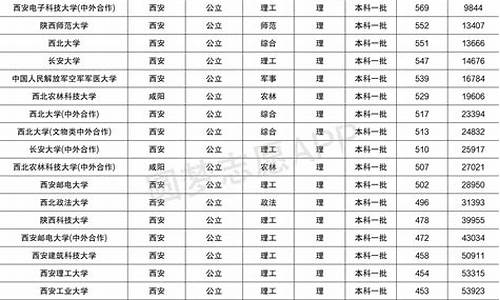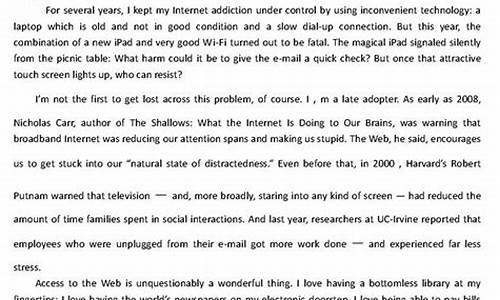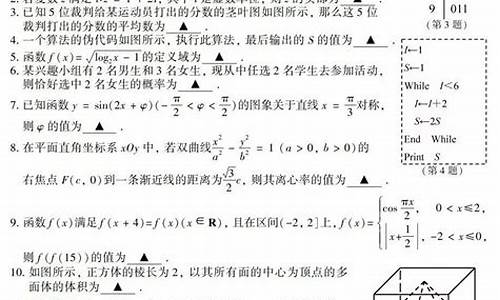您现在的位置是: 首页 > 招生信息 招生信息
陕西省2017高考英语,2017陕西高考答案
tamoadmin 2024-05-31 人已围观
简介1.如何评价2017年高考全国卷一英语2.高考英语阅读理解训练3.2017高考备考之英语3500词短文记忆法4.英语2017高考调研答案一、。 1.A 2.C 3.A 4. B 5. D 二、 1. Have you ever swum 2. he hasn’t visited 3. hasn’t won any prizes
1.如何评价2017年高考全国卷一英语
2.高考英语阅读理解训练
3.2017高考备考之英语3500词短文记忆法
4.英语2017高考调研答案

一、。 1.A 2.C 3.A 4. B 5. D
二、 1. Have you ever swum 2. he hasn’t visited 3. hasn’t won any prizes 4. I’ve alwayswanted to help you 5. has already invite us to travel 三、 1. It’s over 550metres. 2. To take in thebreath-taking view. 3. By rotating once every 72 minutes. 4. Three. / 3. 5. Some information about the CN Tower.
四、。 1.D 2.B 3.D 4.A 5.B 6.B 7.D 8.A 9.B 10.B
五、
Dear Tony, How are you? I’m having a wonderful timein Beijing now. I have done many interesting things here. I have been to manyplaces of interest. I have visited the Tian’anmen Square, the Palace Museumand the Great Wall. I have taken many nice photos of these famous places. I’llsend some to you with this email. I have also enjoyed different kinds ofChinese food. I’ve tried dumplings, noodles and roast duck. They are all verydelicious. I think Beijing is one of the biggest and busiestcities in the world. There’s a lot to see and do here. I hope we can visit Beijing together nexttime. Yours, Tom
如何评价2017年高考全国卷一英语
高考英语常见词汇
在历年的高考英语试卷中,有很多词汇是常见的,为了帮助大家备考2017年的高考,我分享了这些常见词汇,希望能帮到大家!
1.alter v. 改变,改动,变更
2.burst vi./n. 突然发生,爆裂
3.dispose vi. 除掉;处置;解决;处理(of)
4.blast n. 爆炸;气流 vi. 炸,炸掉
5.consume v. 消耗,耗尽
6.split v. 劈开;割裂;分裂 a.裂开的
7.spit v. 吐(唾液等);唾弃
8.spill v. 溢出,溅出,倒出
9.slip v. 滑动,滑落;忽略
10.slide v. 滑动,滑落 n. 滑动;滑面;幻灯片
11.bacteria n. 细菌
12.breed n. 种,品种 v. 繁殖,产仔
13.budget n. 预算 v. 编预算,作安排
14.candidate n. 候选人
15.campus n. 校园
16.liberal a. 慷慨的;丰富的;自由的
17.transform v. 转变,变革;变换
18.transmit v. 传播,播送;传递
19.transplant v. 移植
20.transport vt. 运输,运送 n. 运输,运输工具
21.shift v. 转移;转动;转变
22.vary v. 变化,改变;使多样化
23.vanish vi. 消灭,不见
24.swallow v. 吞下,咽下 n. 燕子
25.suspicion n. 怀疑,疑心
26.suspicious a. 怀疑的,可疑的
27.mild a. 温暖的,暖和的;温柔的,味淡的
28.tender a. 温柔的;脆弱的
29.nuisance n. 损害,妨害,讨厌(的人或 事物)
30.insignificant a. 无意义的,无足轻重的;无价值的
31.accelerate vt. 加速,促进
32.absolute a. 绝对的,无条件的;完全的
33.boundary n. 分界线,边界
34.brake n. 刹车,制动器 v. 刹住(车)
35.catalog n. 目录(册) v. 编目
36.vague a. 模糊的,不明确的
37.vain n. 徒劳,白费
38.extinct a. 绝灭的,熄灭的
39.extraordinary a. 不平常的,特别的,非凡的
40.extreme a. 极度的,极端的 n. 极端,过分
41.agent n. 代理人,代理商;动因,原因
42.alcohol n. 含酒精的饮料,酒精
43.appeal n./vi. 呼吁,恳求
44.appreciate vt. 重视,赏识,欣赏
45.approve v. 赞成,同意,批准
46.stimulate vt. 刺激,激励
47.acquire vt. 取得,获得;学到
48.accomplish vt .完成,到达;实行
49.network n. 网状物;广播网,电视网;网络
50.tide n. 潮汐;潮流
51.tidy a. 整洁的,整齐的
52.trace vt. 追踪,找到 n. 痕迹,踪迹
53.torture n./vt. 拷打,折磨
54.wander vi. 漫游,闲逛
55.wax n. 蜡
56.weave v. 织,编
57.preserve v. 保护,保存,保持,维持
61. abuse v. 滥用,虐待;谩骂
62. academic a. 学术的;高等院校的;研究院的
63. academy n. (高等)专科院校;学会
64. battery n. 电池(组)
65. barrier n. 障碍;棚栏
66. cargo n. (船、飞机等装载的)货物
67. career n. 生涯,职业
68. vessel n. 船舶;容器,器皿;血管
69. vertical a. 垂直的
70. oblige v. 迫使,责成;使感激
71. obscure a. 阴暗,模糊
72. extent n. 程度,范围,大小,限度
73. exterior n. 外部,外表 a. 外部的,外表的
74. external a. 外部的,外表的,外面的.
75. petrol n. 汽油
76. petroleum n. 石油
77. delay vt./n. 推迟,延误,耽搁
78. decay vi. 腐烂,腐朽
79. decent a. 像样的,体面的
80. route n. 路;路线;航线
81. ruin v. 毁坏,破坏 n. 毁灭,[pl.]废墟
82. sake n. 缘故,理由
83. satellite n. 卫星
84. scale n. 大小,规模;等级;刻度
85. temple n. 庙宇
86. tedious a. 乏味道,单调的,
87. tend vi.易于,趋向
88. tendency n.趋向,趋势
89. ultimate a. 极端的,最大的,最终的 n. 极端
90. undergo v. 经历,遭受
91. abundant a. 丰富的,充裕的,大量的
92. adopt v. 收养;采用;采纳
93. adapt vi. 适应,适合;改编,改写 vt. 使适应
94. bachelor n. 学士,学士学位;单身汉
95. casual a. 偶然的,碰巧的;临时的;非正式的
96. trap n. 陷阱,圈套 v. 设陷阱捕捉
97. vacant a. 空的,未占用的
98. vacuum n. 真空,真空吸尘器
99. oral a. 口头的,口述的,口的
100. optics n. (单、复数同形)光学
;高考英语阅读理解训练
一是选材丰富多用,渗透中外文化,助力文化品格培养,倡导科技,培育学生的情怀和国际视野,落实立德树人任务,体现学科核心素养的渗透。此次全国卷1高考英语试题的素材选材符合真实性强、时代性强、题材广泛、体裁多样、语篇典型、难度适合的原则。体裁覆盖了记叙文、说明文、议论文和应用文等四大文体。选用的语篇材料社会生活、历史文化、科普知识、饮食等,均和学生生活紧密相关。具体话题包括宣传手册(阅读A,介绍Pacific Science Center)、个人情况(阅读B,在野生动物救援和教育组织工作)、艺术与传承(阅读C,爵士乐)、科普知识与技术(阅读D,自制蒸馏器)休闲生活(七选五,露营体验)、学校生活(完形填空,在学校学习美式手语的事情)、饮食与健康(语法填空,在饮食中不能过少或过多摄入脂肪和盐分,两种情况对健康都不好)、难忘经历(短文改错,生日后假期学车时的紧张心情)、传统文化推广(写作,教朋友Leslie学习汉语、唐诗)等话题,具有丰富的人文内涵、现实意义和育人价值。
二是倡导语篇能力,对语言知识运用、阅读理解及写作能力的考查均在语篇层次进行,注重综合运用能力的考核。各部分的任务兼顾真实性、实用性和趣味性,高度考查了学生的运用语言分析和解决问题能力。问题设置力求典型、规范,各部分考点设置分布合理,难度搭配适当,较全面地考查了学生应当掌握的基本语言技能以及各语言技能中包含的具体语言运用能力。命题语言(题目与选项)具有一定的难度,需要学生具有较高的解读(paraphrase)能力,能够反映一直以来高考全国卷的变化趋势。七选五侧重于对学生理解文章结构即文章内容连贯能力的考查,要求学生具有较高的语篇分析能力。
三是写作任务真实。2017高考英语写作是给朋友写信告知下次上课计划,题材是学生平时生活和学习中所熟悉的,又是学习和生活中用得上的,有很强的实用价值;同时具有很强的生活气息,突出了在生活中使用英语传递信息的必要性和真实性,充分体现了用英语做事的教学理念:将来无论在国内大学或者国外深造,导师与学生在很多时候都是采用email联系、交流、布置任务。
语篇材料生词量与阅读量控制得当。2017年全国卷1阅读理解部分的总词量为1894词,文本长度为1436词,与2016年全国卷相比,要求接近(全国卷2007~2016年阅读理解总词量在1800~2000词之间,文本长度在1300~1400之间;其中全国1卷阅读理解长度为1914词,文本长度为1309词)。
完形填空考查学生在篇章层面综合运用背景知识、语言知识和逻辑判断等手段进行意义补全的能力,重点考查实词的用法。要求学生在掌握文章主旨大意和正确理解句与句、段与段之间的内在联系的基础上,准确判断动词、名词、形容词、副词等的意义和作用,语篇层面的考查要点占较大比例。
语法填空考点设置符合考纲要求以及课程标准所倡导的语言学习理念,在语篇层面上考查对语法知识掌握和应用的情况,不仅关注语言基础的词法和句法考查,还重视对语篇逻辑和意义连贯的判断,符合语言真实性的要求。与2016年全国卷1考点相比,此次没有考副词和代词,适当增加了主谓一致和形容词比较级,难度基本持平,答案保持了最大限度的唯一性,信度较高。
短文改错考点设置均为高中阶段学生学习英语过程中常犯的错误类型及项目,考点与考试大纲的样题及近年高考全国卷的考点相一致,对于词法、句法和行文连贯的考查分布合理,重视学生对于语篇的整体理解和逻辑判断。与2016年全国卷1考点相比,适当增加了序数词的考查。
书面表达对于部分写作内容有所限定(如学习内容和课前准备),以保证评分的效度,但对于时间和地点给予了半开放,对学习汉语、唐诗等的意义这些拓展则不作内容规限,保持一定开放性。写作任务对学生运用背景知识,合理拓展写作内容的能力要求比较高,任务能够充分考量学生就话题所表达内容的思想性、合理性和丰富度。
2017高考备考之英语3500词短文记忆法
高考英语阅读理解精品训练2017
近几年高考英语阅读主要有猜测词义、理解主旨大意、推理判断、对文章的细节理解、 数据推算等几种题型。为了帮助大家备考高考英语阅读理解题,我分享了一些高考英语阅读理解练习,希望能对大家有所帮助!
阅读理解练习1
Not many years ago, a wealthy and rather strange old man named Johnson lived alone in a village in the south of England. He had made a lot of money in trading with foreign countries. When he was seventy?five, he gave ? 12,000 to the village school to buy land and equipment (设备) for a children?s playground.
As a result of his kindness, many people came to visit him. Among them was a newspaperman. During their talk, Johnson remarked that he was seventy-five and expected to live to be a hundred. The newspaperman asked him how he managed to be healthy at seventy?five. Johnson had a sense of humour (幽默). He liked whisky (威士忌酒) and drank some each day. ?I have an injection (注射) in my neck each evening.?he told the newspaperman, thinking of his evening glass of whisky.
The newspaperman did not understand what Johnson meant. In his newspaper he reported that Johnson was seventy?five and had a daily injection in his neck. Within a week Johnson received thousands of letters from all over Britain, asking him for the secret of his daily injection.
1. Johnson became a rich man through
A. doing business. B. making whisky. C. cheating. D. buying and selling land.
2. The gift of money to the school suggests that Johnson
A. had no children. B. was a strange man.
C. was very fond of children. D. wanted people to know how rich he was.
3. Many people wrote to Johnson to find out
A. what kind of whisky he had. B. how to live longer.
C. how to become wealthy. D. in which part of the neck to have an injection.
4. The newspaperman
A. should have reported what Johnson had told him.
B. shouldn?t have asked Johnson what injection he had.
C. was eager to live a long life.
D. should have found out what Johnson really meant.
5. When Johnson said he had an injection in his neck each evening, he really meant that
A. he liked drinking a glass of whisky in the evening.
B. he needed an injection in the neck.
C. a daily injection in the evening would make him sleep well.
D. there was something wrong with his neck.
阅读理解练习2?I?m very tired from working here,?said Jean to her friend Kate,? I?m on my feet from morning to night. For the first quarter of the day, I clean up the counter (柜台) and set the tables. For the next quarter, I help in the kitchen. For the second half of my workday, I take orders at the counters.?
?Kate, I wish I had your job,?Jean went on. ?For four hours you just sit at the cash register (收款台) taking in money.?
?But I spend two more hours in the kitchen (厨房) than you do,?said Kate. ?It?s tiring to cook over a hot stove. I don?t think you?d really want my job. In fact, I?d like your job.?
1. Both Jean and Kate probably work in a
A. hotel B. library C. lab D. shop
2. How long did they work every day?
A. eight hours B. twelve hours. C. Ten hours D. Nine hours
3. How long did Kate spend in the kitchen?
A. a quarter day. B. A half day. C. One-third day. D. Three-fourths day.
4. From this passage we can see that
A. they are both interested in their work. B. their work is neither tiring nor busy.
C. both of them are tired of their work. D. they?ve decided to give up their work.
5. Give a proper proverb (谚语) to Jean and Kate.
A. It?s never too late to learn.
B. It?s no use crying over spilt milk.
C. The grass is always greener on the other side.
D. One swallow(燕子) does not make a summer.
阅读理解练习3In 1985 a French television company sent its reporters to the Paris Metro. They took cameras to see what passengers would do if they saw someone attached on the platform or in the trains. They acted out incidents. The incidents looked real but they were all done with the help of actors. However, very few people tried to help, and most passengers pretended not to notice. in one incident, a foreigner was attacked by three men. The attack was on a train which was quite full, and although one man tried to get the passengers to help, they all refused. It seems that such behaviour(行为) is not unusual, but the question is why? Is it a problem of big cities, or would the same thing happen anywhere? To discuss these questions, we have in the studio(演播室) Professor Wilson, who is an expert on the subject?
1. Who did the experiment?
A. A French television company. B. The Paris Metro.
C. The City Government of Paris. D. Professor Wilson.
2. What did the experiment try to find out?
A. How a foreigner was attacked on the train.
B. How passengers helped each other on the platform.
C. Passengers? reactions towards incidents.
D. Actors? performances during incidents.
3. What was the finding of the experiment?
A. Passengers helped a lot during incidents.
B. Very few foreigners were on the train.
C. Very few passengers tried to help during incidents.
D. Some people were good at acting on the train.
4. Who do the underlined words one man refer to?
A. One of the three men who attacked a foreigner.
B. One of the actors who took part in the experiment.
C. One of the passengers who were on the train.
D. One of the reporters who were sent to the Paris Metro.
参考答案:
1A 2 C 3 D 4 D 5 A
1A 2 A 3 B 4 C 5 C
1D 2 C 3 C 4 B
;英语2017高考调研答案
很多人认为学英语就是背单词,还有人认为背单词就是要一下把它默写出来,其实这些都是错误的看法。 首先,背单词只是学英语过程中的一个重要环节,但不是决定性的环节。什么才是决定性的环节?我只能说认识单词、读准单词才算得上是一个决定性的环节。就像你到了一个陌生的地方,是不可能把新同事、新同学一下完全了解清楚的,一开始只要能认识他们,叫得出名字就算可以了。如果你是有备而来,一开始就阅读了他们的档案,对他们的一切了若指掌,我想你应该是来研究他们的,而不是来和他们交朋友的,那样你可能会陷入研究而不可自拔。 要点1:一开始仅需认识并读准单词,无需刻意背、默写单词。 要点2:认识读准单词后,高频度接触(此过程能背出一部分单词)。 如果是中学生,一般是在学习新课文时接触新单词,并熟悉它们。对于有较高智能的中学生而言,可以在开学前的假期里熟悉课本最后的生词表,力争每个单词都认识,知道其基本含义,然后经常朗读课文。当然朗读时你会遇到很多问题:可能不懂某些语法,不知道句子的意思……太多了。“文章硬如铁,读来满口血”就是指这种情况。如果你真的读不下去,最好就是去读前几学期你学过的课本,像读小说一样地阅读。我敢肯定有不少页面是没有作过记号的,那意味着你囫囵吞枣的过去。建议向老牛学习:辛勤地干活,不时还反刍一下。 对有一定基础但并非高手的成年人,其学习方法最好向较高智能的中学生看齐:以单元或整本书为单位来认识单词,在学习前就集中认识相关章节的单词。注意是认识而不是默写,然后高频度地朗读课文,经常接触这些单词。熟悉到一定程度再考虑默写和背。如果是英语高手,即使按照下述的机械记忆法,也能过单词关。 要点3:按词汇表认读单词;熟悉到一定程度再考虑完全默写和背单词。 可以将背诵单词的方法大致分为两类:一类是传统的机械记忆,一类是褒贬不一的形象记忆。当然,这两者不是绝对排斥的。传统的机械记忆法,包括构词记忆法、阅读记忆法、协同记忆法、分类记忆法、循环记忆法等。构词记忆法分析单词的构成成份,辨识其中的词根或词缀,在掌握词根或词缀的前提下,可以触类旁通,以一当十。阅读记忆法就是通过大量和反复的阅读掌握词汇。协同记忆法强调手眼耳多种感官并用。分类记忆法是将同一类属或相似意义的词划分到同一类,集中背诵。循环记忆是根据艾宾浩斯的遗忘曲线编排记忆内容和进度,以达到减缓遗忘速度的目的。除此之外,黎学智的逻辑记忆法和星火式记忆法(各大书店有相关的学习资料)也是常见的方法。单独强调一种方法都有一些学究气(即研究者沉溺于自己的理论体系中,忽视用户的实际需求),读者需要明察。如果您要用传统的方法记忆大量单词,必须要有足够的时间、精力和周密的计划,否则很容易产生挫败感。建议按照下属步骤进行: 1.确定目标。根据自己的实际情况和近期内的需要,确定需要背诵的单词范围和时限。如果是想考四级,就把目标确定在四级单词上。否则,如果好高骛远的话,会因为单词的孤军深入(缺乏阅读、语法、作文等配套训练)而损兵折将,导致记忆大量流失。 2.选择适当的单词表(3000词左右为宜)。这个单词表应该是这样的:单词排列清晰,有国际音标,有最常用的汉语注释(一般是一到三个注释,不超过五个)。不要选择花里胡哨的字典、英汉双解、附有大量解释、同义反义、例句等分散注意力的单词表。 3.每天背100到200个单词。采用上述方法中的多种手段,尽快背完(一般控制在一月之内)。力争对每个单词都有印象,但不要因为个别单词影响整个进度。 4.坚持复习词汇表(每天扫一遍,划去已经认识的单词),并辅以大量练习。此时,您可以仔细研究单词的含义以及它们之间的联系,可以看一些英汉双解、例句、同义词、反义词、同类属的词。可以阅读与词汇表相配的材料。 大量背诵单词一定要集中时间和精力背诵,那种认为一天背十个,一年就背多少个的想法是不现实的。也不要试图直接通过阅读小说或报纸而背诵大量单词。阅读小说时不要查字典,碰到您在单词表中见过的单词可以多留意一下,没见过的最好是不要理会。您的目标就是那个词汇表。背完后可以再背下一个词汇表。 形象记忆法适合于有相当基础的学习者。由于谐音法(三克油=thankyou?)在其中占据了相当重要的位置,它受到许多正统教师的指责,说它把学生“教坏了”。但是,以我的亲身体验,这实在是一种妙不可言的方法。不过,它的功效取决于形象代码的优劣。有不少人打着形象记忆的幌子,却又缺乏创造力和想象力,败坏了这一方法的声誉。如果您能找到姚鸿恩著的“英语单词形象记忆法”一书,一定要好好研读它。我私下认为,这是一本最好的记忆法+单词的书籍,以下的介绍和大部分例词出于此书。 首先,您得有一个单字母、常用双字母和多字母的形象代码表。例如,a形象为“果”(像苹果吗?),谐音为“鸭”。o形象为“洞,轮”。x为“禁止、错误”。ad为“广告”(advertisement的缩写),ed为“过去”(动词的过去式一般都在后面跟ed)。同理,est为“最”。pla为“解放军”。 首先出场的是熟字形象法。例如catwalk(狭窄的过道)记为“猫(cat)走(walk)狭窄的过道”,kidnap(绑架)记为“小孩(kid)小睡(nap)时被绑架”,mature(成熟)记为“好像自然(nature)变成熟”。cur(恶狗)记为“没有被(e看起来像被子)治愈(cure)的恶狗”。 然后是谐音法。amen就是阿门(直接音译过来)。abolish啊暴力须废除。abyss鸭比试,在深渊。alien爱恋外国的侨民。*****别去对母狗发牢骚。boff暴富狂笑。cackle开口儿咯咯笑。brute哺乳它是畜生。 串联形象法。absolute绝对专制的上帝。familiar熟悉的伴侣是无拘无束的常客。 综合形象法。immolate阴谋最近导致谋杀(immo谐音为阴谋,late=最近)。drear大*股沉闷忧郁(d形象代码为“大”,rear=*股)。Adonis广告上面是美少年(Ad=广告,on=上面,is=是)。hesitate他坐着吃鱿鱼(犹豫),或记为:他犹豫地坐着吃(he=他。sit=坐,ate=eat的过去式)。
Ⅰ. 1. tutor 2. original 3. upset 4. argued 5. pushy
6. enough 7. style 8. matter 9. compare 10. complained
Ⅱ. 11. surprises 12. except 13. fail 14. pressure 15. compare 16. don’t have enough money 17. what should I do/what to do next 18. ask your teacher for help 19. argue with each other for money 20. from a young age
Ⅲ. 21. more 22. sandwiches 23. was invited 24. interested 25. dancing 26. different 27. friend’s 28. to buy 29. really 30. carefully
Ⅳ. 31. D 32. A 33. C 34. A 35. D 36. A 37. A 38. B
39. C 40. D 41. B 42. A 43. A 44. A 45. C
Ⅴ. 46. do you 47. doesn’t need any 48. the same age as 49. should not , either 50. what to do
Ⅵ. 51-55 C B A D B 56-60 B A D A D
Ⅶ A. 61-65 A A D A C B.66 friends 67informtion 68quickly 69eyes 70correctly









